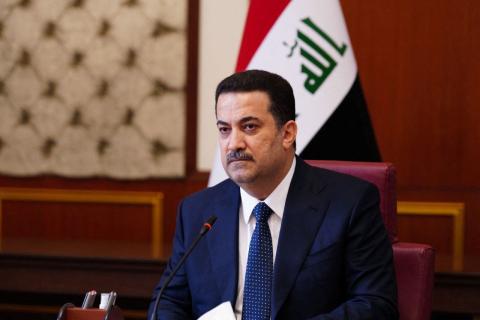
The fate of Iraqi Prime Minister Adel Abdul Mahdi remains in the hands of lawmakers who are debating a no-confidence motion as protesters, who took to the streets early this month, continue to call for “overthrowing the entire regime”.
Protesters gathered on Wednesday in Baghdad’s Tahrir Square and in several southern cities, breaking the curfew of the past two nights in a clear message to political parties that they will not accept anything less than the resignation of all officials.
Leader of Fatah bloc Hadi al-Amri, who has previously backed Abdul Mahdi, said he agrees to “cooperate” with influential Shiite leader Moqtada al-Sadr, who has been calling for the resignation of the government since the beginning of this month.
However, Amri did not refer to any possible scenario for the resignation, which was interpreted by political observers in Baghdad that Fatah is still supportive of the Prime Minister.
Sadr urged Amiri to push for the government’s resignation to avoid “turning Iraq into another Syria or Yemen,” two countries where revolts against the regime have erupted into civil war.
Abdul Mahdi has been asked to appear “immediately” in parliament, which may turn into an accountability and a vote of no-confidence session, as confirmed by many deputies.
It is not yet known whether the Iraqi parliament will approve the condition set by the PM to attend the councils sessions.
MP of Saeroon bloc Burhan al-Maamouri said that the constitutional resignation of Abdul Mahdi can only be done by providing evidence on the responsibility of the authorities in the deaths of protesters.
Maamouri said dozens of people have died in the protests, which is enough evidence to condemn the PM. Bloodshed cannot be tolerated, he told Asharq Al-Awsat.
The MP said that certain parties are still supporting Abdul Mahdi to stay in office. This is dangerous, he added.
In related news, the head of the National Wisdom Movement, Ammar al-Hakim, asserted that protesting is a constitutional and legal right.
In a statement issued by his office after a meeting with the outgoing British ambassador in Baghdad, John Wilkes, Hakim called on the security services to shoulder their responsibility in maintaining security and protecting demonstrators, and public and private properties.
He reiterated his call to meet the people’s rightful demands, urging the government, parliament, the judiciary and political parties to be responsible.
Meanwhile, in an unprecedented move, Special Representative of the UN Secretary-General for Iraq (SRGC) Jeanine Hennis Plasschaert visited Tahrir Square and joined the demonstrators.
Rather than holding talks with Iraqi political leaders, Plasschaert arrived at the Square with little protection, riding a tuk tuk.
The tour comes after the UN condemned the use of violence against demonstrators by the Iraqi authorities.
The SRGC called for a national dialogue to identify prompt and meaningful responses to break the vicious cycle of violence, and to unite against the perils of division and inaction.
“Standing together, Iraqis can find the common ground needed to shape a better future for all.”












